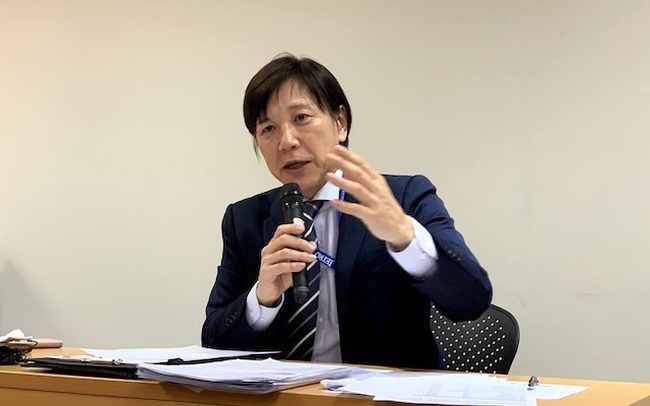Japanese enterprises are supported up to 5 billion yen when expanding investment in Vietnam

15/30 enterprises that have been selected for the first time in the framework of the support program to diversify supply chains and expand production have chosen Vietnam as a destination. Japanese enterprises are supported up to 5 billion JPY, equivalent to 1,050 billion VND for the expansion of production investment.
At a press conference to inform about 15 Japanese enterprises expanding their investment in Vietnam this afternoon (July 23), Mr. Takeo Nakajima, Chief Representative of the Japan Trade Promotion Office (JETRO) Hanoi said, in the first recruitment examination by the Ministry of Economy, Trade and Industry (METI) announced on July 17, out of 124 businesses applying, 30 enterprises were selected to support production expansion and supply chain diversification from China to ASEAN, in which, 15 enterprises chose to register to expand investment in Vietnam.
Businesses in the program will receive support ranging from 1 million JPY (50 billion VND) to 5 billion JPY (1.50 billion VND), the support rate depends on the size of each project.
The next step is JETRO and the business will sign the agreement. Then, based on the approved agreement and plan, the enterprise will conduct investment and production. After that, JETRO and METI will verify whether the product is in accordance with the agreement and approved plan or not. Only then will the Government provide support through JETRO.
Mr. Takeo noted that this is about expanding production and diversifying supply chains, not shifting production. For example, to produce a pen, the ink cartridge details will be manufactured at factories in both Vietnam and China to minimize risks when the supply chain is disrupted due to the impact of the Covid-19 epidemic.
A representative of JETRO said that 15 businesses that have chosen to expand their investment in Vietnam show that business prospects in Vietnam are very good. At the same time, the fact that Vietnam was able to control the epidemic early in the region is also an important factor for Japanese investors to choose Vietnam as a destination. In the long term, the expansion of investment by Japanese enterprises in Vietnam is also to take advantage of a market of nearly 100 million people and opportunities for goods originating from the FTAs that Vietnam has signed.
Supporting businesses to expand investment and diversify supply chains aims to strengthen trade and investment cooperation between Japan and ASEAN.
Diversifying production activities instead of concentrating in one location will increase the production cost of enterprises by about 20%. However, the advantages of the Vietnamese market which are more competitive labor costs, cheaper investment costs in industrial parks and preferential tariffs for exports to important markets such as the EU and the US... will offset the higher cost increase due to diversification of production locations. Meanwhile, Japan's supply chain in Korea, Taiwan, Thailand... has been standardized, but investment costs are higher and labor costs are escalating. This reinforces the decision to expand the investment of Japanese enterprises.
The Government's policy to support Japanese businesses to expand investment and diversify supply chains has been introduced recently and without precedent. However, the Covid-19 epidemic has made the time for this program to take place earlier.
The chief representative of JETRO Hanoi also expressed concern that Vietnam has not yet allowed foreign experts to enter, which may affect the progress of Japanese enterprises' implementation of production and diversification projects.
Earlier, on July 17, according to a source from Bloomberg, the Japanese Ministry of Economy, Trade and Industry announced the list of 57 companies receiving the support of JPY 57.4 billion, equivalent to USD 536 million under the program of supply chain diversification and production expansion, including private mask manufacturer Iris Ohyama and Sharp Corporation. Among the 30 companies registered to expand their investment to ASEAN, 15 have chosen to invest in Vietnam.
Regarding this information, economic expert Nguyen Duc Thanh said that the answer lies on the Vietnamese side. Currently, the trend of competition to attract capital flows is becoming more and more fierce and Vietnam is not the most ideal destination due to shortcomings in labor quality and infrastructure. At the same time, Vietnam is still limited in terms of mechanisms to carry out administrative procedures and corruption is still causing Vietnam to lose points in the eyes of big investors.
Mr. Takeo also said that the limitations of low localization rate, corruption and the implementation of policies with different levels of understanding at the central and local levels trouble the investment process of foreign investors.
Other Posts
- FDI disbursement in Vietnam hits record high
- 10 outstanding events of Vietnam's economy in 2023
- Improve efficiency from FTA agreements
- Budget revenue exceeded plan
- Economy 2023, forecast 2024: Vietnam's economy through the perspectives of international experts
- Experts emphasize the human factor when Vietnam develops the Digital Economy
- World Bank: 2023 is a "resilient" year for Vietnam's economy
- Approve the Planning for exploration, exploitation, processing and use of minerals as construction materials
- Enhance international integration capacity
- It is forecasted that international flight passengers will increase and domestic flights will decrease


